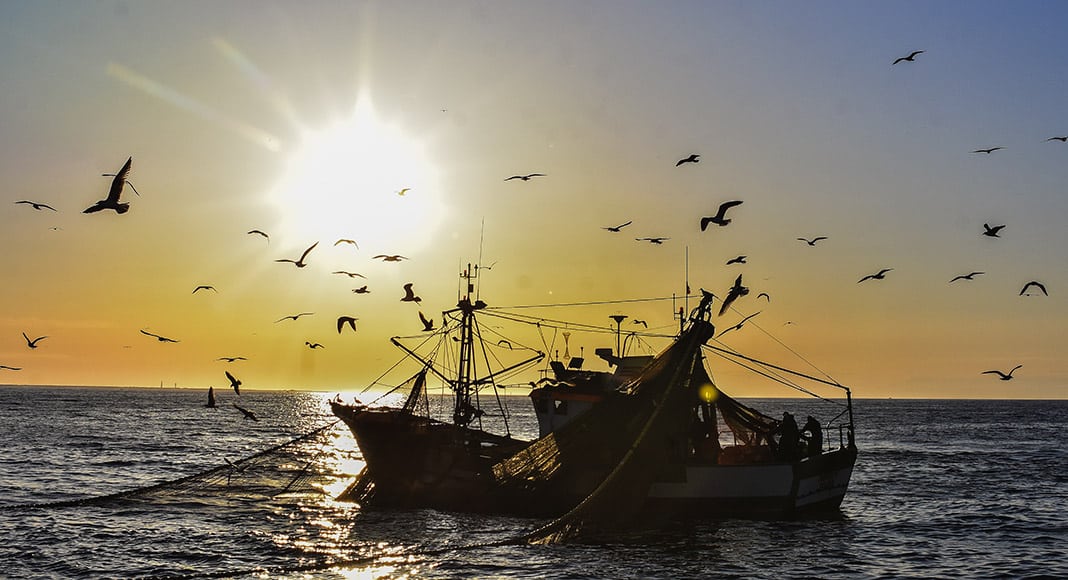Fishermen launch petition, explaining how desalination process kills marine life
Algarve fishermen have upped the ante in the environmental battle to stop a €108 million desalination plant from being constructed above one of Albufeira’s most iconic beaches.
Quarpesca – the association of fishermen operating out of Quarteira – has always said that a desalination plant would be a “tragedy” for the sector. But it hoped that the legal challenges already in place would head it off.
It now seems that they won’t. As the Resident has mentioned before, minister for the environment and energy Maria de Graça Carvalho, told Expresso late last year that the government has passed a law to block the effect of all legal challenges to projects within the EU-funded PRR programme (PRR standing for Plan for Recovery and Resilience), as these need to be carried out according to a timeline, and thus cannot be ‘held hostage’ by citizens’ complaints.
This was such a shocking statement at the time that no-one could believe what they had heard: Portugal’s social democrat government passed a decree to block citizens’ recourse to law.
As legal sources insist, this is unconstitutional. Thus Quarpesca is riding into this fight. “We are still living in a democratic state”, Hugo Martins, president of Quarpesca, stresses. “People and their opinions should count”.
Quarpesca is also bringing new ‘information’ into the mix to try and convince people that what is planned is truly every bit as disastrous as environmental groups have been saying it is.
The association has been in touch with Spanish fishing associations to find out how they have fared in areas with desalination plants (Spain currently has over 700 coastal desalination plants). What they were told confirmed their fears, explains Martins: the toxic mix of ‘chemical sludge and brine (salt)’ channelled back into the ocean from the manufacture of ‘drinking water’ kills molluscs and bivalves – the food on which fish depend – meaning fish simply go elsewhere.
Very much like offshore wind turbines, desalination plants create marine deserts – and spell disaster for hundreds of people/ families whose livelihoods depend on coastal fishing.
Considering the Algarve’s fleet is already hampered by EU and national rules and regulations limiting areas where fishing is allowed/ quantities that can be fished – and by tourism/ water sports and aquaculture projects – this plan for a desalination plant pumping tons of brine and chemical sludge into the sea 24/ 7 will essentially kill the industry.
Much of this has been said before – but is anyone listening?
The talk given in Quarteira last summer by biological engineer Cláudia Sil would leave no one thinking a desalination plant was what the Algarve needed, but the event only mustered a few environmental die-hards.
The difference now with Quarpesca’s involvement is that fishermen truly have ‘skin in the game’. They will be among the first to suffer from this plan. In fact, it spells their extinction. They won’t give up lightly.
For the full text of Quarpesca’s petition, see below. It has been online, on the petição pública site, since Thursday:
Petition text:
“The sector is aware of the importance of the water issue, which in the Algarve has been a problem that has worsened in recent years. What we can’t accept is that a project should lead to the extinction of an activity in a large part of the region!
“The project is planned for one of the Algarve’s finest beaches – Falésia.
“Just a few miles away is the Algarve Marine Park, a sanctuary for many species of scientific and commercial interest (Pedra do Valado Marine Park). This marine park and all the investment involved in its implementation is at stake with the possible implementation of a desalination plant.
“QUARPESCA, after dialogue with Spanish fishermen in areas where similar projects have been implemented, has easily concluded that they have put an end to activity in the areas where they have been implemented.
“The effect of water treatment takes a heavy toll on the environment. Chemicals are used, and the excess salinity drives all living species out of the area, especially bivalves, which are very important in the food chain of most species.
“The discharge of these materials into the sea, together with the salt resulting from the desalination process, dramatically alters the space that is home to immense marine species.
“There are alternatives to implementing this project. Rigour in the control of losses from the public network and the use of rainwater through catchment structures (one has to assume that it rains in a day today what it used to rain in a month years ago).
“The Algarve fishing sector is promoting this petition so that all the players involved are aware of the growing difficulties the sector is going through; of the indignation of its professionals, companies and representative organisations, of the impoverishment of fishing communities. It is demanding measures that can reverse the current scenario, giving the sector and those who depend on it a future.
“The undersigned citizens are signing this document because they consider it necessary to resolve and close the above-mentioned project.
“Once these signatures have been collected, they will be sent to the CCDR Algarve, the National Government, the municipalities most affected by the impacts of this situation and the political forces represented in the Assembly of the Republic, in particular the President of the Republic”.




















